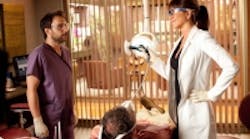By ChicagoHealers.com Practitioner Raymond G. Hatland, DDS© Dreamstime.comApproximately 80% of all people have some kind of bite discrepancy, and about 70% of these people will have destructive oral habits or compression disorders such as clenching, bruxing, or grinding their teeth together because of their bite discrepancy. These oral habits are the main reason patients get headaches and injure the jaw joints, known as the temporomandibular joint (TMJ). Oral compression habits are the second most common reason for having pain in the teeth or cold sensitivity. Signs and symptomsHow do you know if you have a bite problem and/or a compression disorder such as clenching or bruxing? Here are some tips for recognizing potential bite discrepancies:
- Hypersensitive teeth
- Headaches more than once a week.
- Enlarged jaw muscles
- Keeping your teeth together for long periods during the day
- Waking up with pain or stiffness in your jaw
- Difficulty sleeping and waking up two or three times during the night
- Mild to moderate wear facets on your teeth (this usually takes a dentist to see)
- Clicking or popping sounds in your TMJ when you open or close
- Grating sounds, called crepitus, in your TMJ when you open or close
- Chronic neck tensions or low back pain
- Unable to hold a chiropractic adjustment or manipulation
- History of trauma to the head or jaw from a car accident or fall
Raymond Hatland, DDS, attended the University of Illinois in Urbana from 1960 to 1962, and the University of Illinois College of Dentistry from 1962 to 1966, graduating in the upper 20% of his class. He participated in the U.S. Army’s one-year rotating internship program at Ireland Army Hospital in Fort Knox, Ky., receiving advanced training in all specialty areas including oral surgery, fixed and removable prosthodontics, endodontics, periodontics, orthodontics, pedodontics, and oral medicine. Since 1975, Dr. Hatland has taken more than 1,600 hours of continuing-education courses in all of the above areas of dentistry as well as functional orthodontics and many alternative and energy system related courses and seminars, and has written several articles about his periodontal research regarding the reverse gum disease program. Dr. Hatland has been selected as a member of America’s Top Dentists and named Dentist of the Year for 2003 through 2005 by the Consumer Business Review. He is a member of the American Dental Association, the Indiana Dental Association, the Indianapolis District Dental Society, the Holistic Dental Association, and an associate member of the Chicago Dental Society. Dr. Hatland is also a practitioner with the ChicagoHealers.com network.






